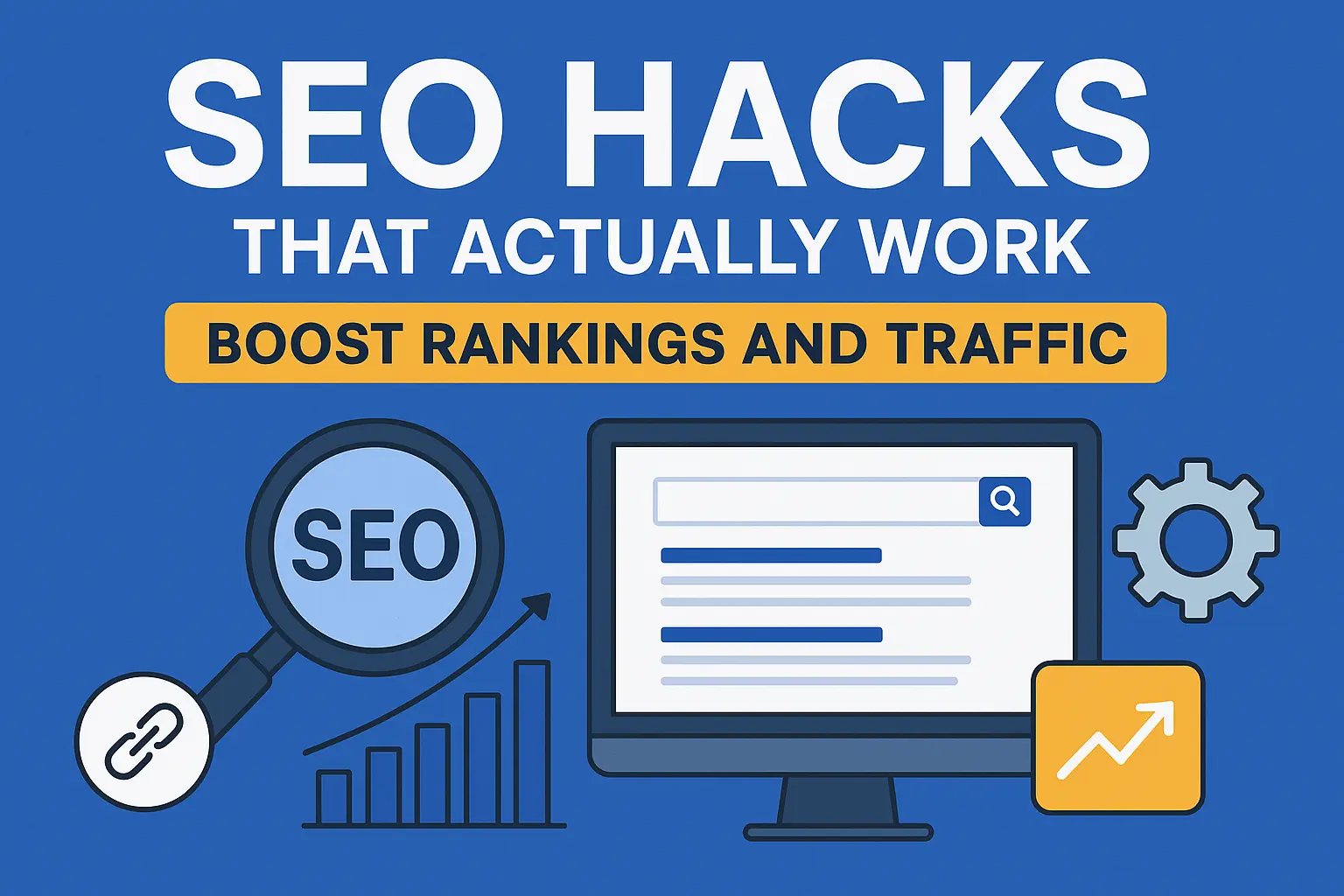SEO Hacks: This blog explores advanced SEO hacks to enhance rankings, traffic, and online visibility. Covering URL structure, content optimization, link strategies, and technical fixes, it provides practical, actionable insights for businesses, bloggers, and marketers who want to grow faster in search engines.
SEO Hacks Why Crucial for Growth

Search is competitive. Millions of businesses are trying to rank for the same keywords, which means you need more than basic SEO practices to succeed. That’s where SEO hacks come in—clever adjustments that maximize impact without wasting time or money.
For example, optimizing your URL structure not only helps search engines understand your content but also improves user experience. Similarly, internal links guide visitors through your website while spreading ranking authority across pages.
SEO Hack #1 – Master Your URL Structure
A clean and keyword-rich URL structure is one of the easiest SEO wins. Google prefers short, descriptive URLs that clearly show what the page is about.
Best Practices for SEO-Friendly URLs:
- Keep them short and simple (avoid unnecessary words)
- Include your target keyword (e.g.,
/seo-hacks) - Use hyphens instead of underscores
- Avoid numbers and dates unless necessary
Bad Example:www.example.com/blog/article-12345
Good Example:www.example.com/seo-hacks
SEO Hack #2 – Optimize Meta Title & Description
Your meta title and description act as your first impression on Google’s results page. A catchy, keyword-rich title can significantly boost your CTR (Click-Through Rate).
- Keep the title under 60 characters
- Use primary keyword early in the title
- Make the description compelling within 160 characters
- Add a call-to-action (CTA) to encourage clicks
This hack ensures your content attracts attention before users even click through.
SEO Hack #3 – Internal Linking Done Right
Internal links pass authority and guide users. Linking relevant pages not only improves SEO but also reduces bounce rates by keeping visitors engaged.
Here’s how to do it smartly:
- Link to relevant service pages, e.g., check out Growvilo Services
- Use exact-match anchor text when relevant
- Don’t overload with too many links—focus on quality
For example, if you’re interested in scaling your business with SEO, you can explore Growvilo or directly reach out via Growvilo Contact Page.
SEO Hack #4 – Create Content That Google Loves
Content remains king, but not all content performs equally. The key is to balance depth, relevance, and freshness.
Content Hacks:
- Write long-form articles (1500–2000 words)
- Use H1, H2, H3 tags for hierarchy
- Add statistics, case studies, and examples
- Update older posts regularly with new data
By aligning with search intent, you not only rank higher but also build trust with your audience
SEO Hack #5 – Improve Page Speed & Core Web Vitals
Google’s Core Web Vitals (CWV) are now a ranking factor. A slow-loading website frustrates users and reduces conversions.
Quick Fixes for Speed:
- Compress images into WebP format
- Use a fast hosting provider
- Minify CSS, JS, and HTML
- Implement lazy loading for images
According to Google Developers, optimizing site speed can improve rankings and reduce bounce rates by up to 50%.
SEO Hack #6 – Leverage External & Internal Links
Link building is the backbone of SEO. While backlinks are essential, linking out to reputable external sources also boosts credibility.
Example: This article references Google’s guidelines and real-world SEO insights from Search Engine Journal.
When combined with internal links to your services and blog content, it creates a balanced link ecosystem.
SEO Hack #7 – Optimize for Voice Search and AI
With AI-driven search assistants and voice devices, conversational keywords are becoming crucial.
Tips to optimize:
- Target long-tail keywords
- Use question-based headings (FAQs help)
- Structure answers in short, direct sentences
This ensures your content appears in featured snippets and voice responses.
SEO Hack #8 – Use Schema Markup
Schema markup helps Google understand your content and enhances how your page appears in search results. For example:
- FAQ Schema → displays questions in SERPs
- Article Schema → improves visibility
- Review Schema → shows ratings
This hack can increase CTR by 30% compared to non-rich results.
SEO Hack #9 – Focus on User Experience (UX)
SEO isn’t just about bots—it’s about people. A better user experience leads to longer sessions and higher engagement.
UX Hacks:
- Mobile-first design
- Clear navigation menus
- Engaging visuals with alt text (e.g., SEO hacks for better rankings)
- Strong CTAs to guide users
SEO Hack #10 – Track, Analyze, and Adapt
No SEO strategy is complete without tracking performance. Use tools like Google Analytics, Search Console, and Ahrefs to measure:
- Organic traffic growth
- Keyword performance
- Click-through rates
- Conversion metrics
This data-driven approach ensures your SEO hacks lead to sustainable growth.
FAQs About SEO Hacks
Q1: What are the best quick SEO hacks for beginners?
A: Start with optimizing URL structure, meta tags, and internal linking. These give quick results without much effort.
Q2: How can I boost my Google rankings fast?
A: Publish high-quality content, build backlinks, and ensure your site speed is optimized.
Q3: Do SEO hacks really work long-term?
A: Yes, when combined with consistent content updates and technical improvements, they offer sustainable results.
Q4: How important is schema markup for SEO?
A: Very important—it helps your content stand out in search results with rich snippets.
Q5: Can SEO hacks replace a full SEO strategy?
A: No, they complement it. Hacks accelerate growth, but a full SEO plan ensures long-term stability.
Conclusion
SEO hacks are not shortcuts—they are smart strategies that amplify your efforts. By focusing on URL structure, content quality, internal linking, and technical optimization, you can boost rankings and traffic significantly.
If you’re looking to take your SEO game to the next level, explore Growvilo, discover tailored SEO services, or get in touch directly via the contact page.



